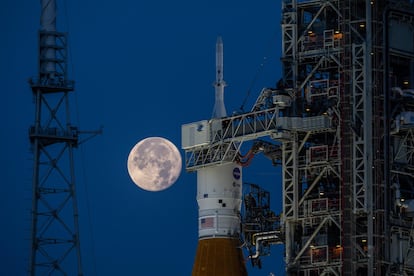Trump puts NASA on pause as Musk’s DOGE prepares to slash costs
The multibillion-dollar overspend by the ‘Artemis’ lunar program puts it in the crosshairs of the government efficiency agency, which is out to cut staffing and expenses

NASA is already under review by the Department of Government Efficiency (DOGE) led by tech mogul Elon Musk. This has been confirmed by the acting chief of the U.S. space agency, Janet Petro, in an email to all staff in which she anticipated that Musk’s team were going to audit NASA contracts. She added that NASA plans to comply with the presidential mandate to initiate large-scale workforce reductions, among other things. The DOGE boss announced his arrival at the agency on February 17, with a tweet asking for the public’s collaboration on “finding and fixing waste, fraud, and abuse at NASA.”
The daily executive orders signed by Donald Trump since he returned to the White House have led NASA to paralyze the activity of advisory committees, while ensuring that they comply with the new presidential directives. And that includes research groups such as MEXAG, which coordinates the scientific study and exploration of the planet Mercury. Its website no longer contains any information, just a message that reads, “The MEXAG website is being reviewed in response to guidance given by NASA leadership.”
The MEXAG team have had to cancel a conference in which they were to meet for the first time in person earlier this month, as revealed by Space News, even though they had previously eliminated all the sessions in which they were to discuss diversity, gender equality, and inclusion, in order to comply with the executive order signed by Trump to eliminate those criteria for hiring in the public sector. Meanwhile, pages are disappearing from the NASA website, such as one that recalled the 1978 astronaut class, the first to include women and ethnic minorities.
While waiting for the outcome of the DOGE audit, NASA has also frozen any decision on its major space projects and missions. Given this, all eyes are on the Artemis program, which aims to return astronauts to the Moon in the next few years, more than half a century after the Apollo missions. For Trump, Musk, and their supporters, Artemis is a prime example of government inefficiency. Its estimated cost has ballooned to more than $93 billion this year, going way beyond the original budget; moreover, each mission to the Moon would mean an additional cost of more than $4 billion for the rocket and spacecraft — the SLS and Orion — which are single-use.
While Musk’s SpaceX receives millions in NASA contracts, the DOGE head has sharply criticized the space agency’s program for returning to the Moon: “the Artemis architecture is extremely inefficient, as it is a jobs-maximizing program, not a results-maximizing program. Something entirely new is needed,” he declared on X last December.
Uncertainty about the future of Artemis has spread in the space sector. The Boeing company, which manufactures the SLS rocket for NASA, has warned its workers that it could lay off hundreds of them this spring, given the program might be cancelled or drastically downsized. An alternative would be to keep it for the time being, but not to go beyond the Artemis 3 mission, which aims to put the first woman on the lunar surface. This mission was delayed again in December until at least 2027.

Why Trump cannot cancel ‘Artemis’
However, even if Musk’s team were to recommend aborting the Artemis program, the U.S. president does not have the authority to execute that cancellation. Trump can propose it, but making changes to budgets that are already allocated is a responsibility that falls to Congress; moreover, Congress is always in charge of deciding what funds are allocated to NASA. And it will not be easy for senators and representatives from Republican states like Alabama, Texas, Mississippi, and Florida — where the manufacture of the SLS rocket and the Orion capsule employs tens of thousands of people — to support any proposed cancellation of Artemis.
Ted Cruz, a Texas Republican senator, has already said that the program should go forward intact for at least a year, and that he plans to push for a vote soon to ensure it. Despite being heavily criticized for its delays and cost, the SLS program — like NASA’s previous colossal adventures — is a rare example of consensus between Democrats and Republicans, who in Congress have always voted as one to fund it.
If Trump decides to cancel Artemis, he exposes himself to the first major clash with Congress of his second term. The Republican majority is slim in both the Senate and the House of Representatives. Such a proposal could not go forward without the support of Republican lawmakers from states severely affected by the cancellation: they would have to choose between loyalty to their leader’s wishes and the economic interests of their own constituents. On top of that, Artemis advocates in Washington such as Republican Brian Babin, chairman of the House Science Committee, argue that cancelling the program would mean giving China a chance to beat the U.S. to the Moon; Beijing plans to put astronauts up there in 2030.
Musk sees the project to return to the Moon as a distraction from efforts to reach Mars, which is, of course, what led him to found SpaceX two decades ago. Trump made Musk’s dream his own in his inaugural address a month ago: “We will pursue our manifest destiny into the stars, launching American astronauts to plant the stars and stripes on the planet Mars,” he said grandly.
But returning to the Moon is compatible with setting foot on Mars, according to Petro, who said last week that the Moon is still a crucial target for the agency. Petro is the first woman to head the space agency, but her position is interim, until Jared Isaacman takes over in the coming months, someone who is not a fan of the Artemis missions.
The billionaire and commercial astronaut is Trump’s pick to lead NASA, pending Senate confirmation of his nomination. In accepting the nomination, Isaacman spoke of the challenges on Mars and the Moon, without mentioning the Artemis missions. Back in October, he endorsed harsh criticism of them from businessman and politician Michael Bloomberg, and declared the program to be an example of NASA’s problems.
Sign up for our weekly newsletter to get more English-language news coverage from EL PAÍS USA Edition
Tu suscripción se está usando en otro dispositivo
¿Quieres añadir otro usuario a tu suscripción?
Si continúas leyendo en este dispositivo, no se podrá leer en el otro.
FlechaTu suscripción se está usando en otro dispositivo y solo puedes acceder a EL PAÍS desde un dispositivo a la vez.
Si quieres compartir tu cuenta, cambia tu suscripción a la modalidad Premium, así podrás añadir otro usuario. Cada uno accederá con su propia cuenta de email, lo que os permitirá personalizar vuestra experiencia en EL PAÍS.
¿Tienes una suscripción de empresa? Accede aquí para contratar más cuentas.
En el caso de no saber quién está usando tu cuenta, te recomendamos cambiar tu contraseña aquí.
Si decides continuar compartiendo tu cuenta, este mensaje se mostrará en tu dispositivo y en el de la otra persona que está usando tu cuenta de forma indefinida, afectando a tu experiencia de lectura. Puedes consultar aquí los términos y condiciones de la suscripción digital.









































